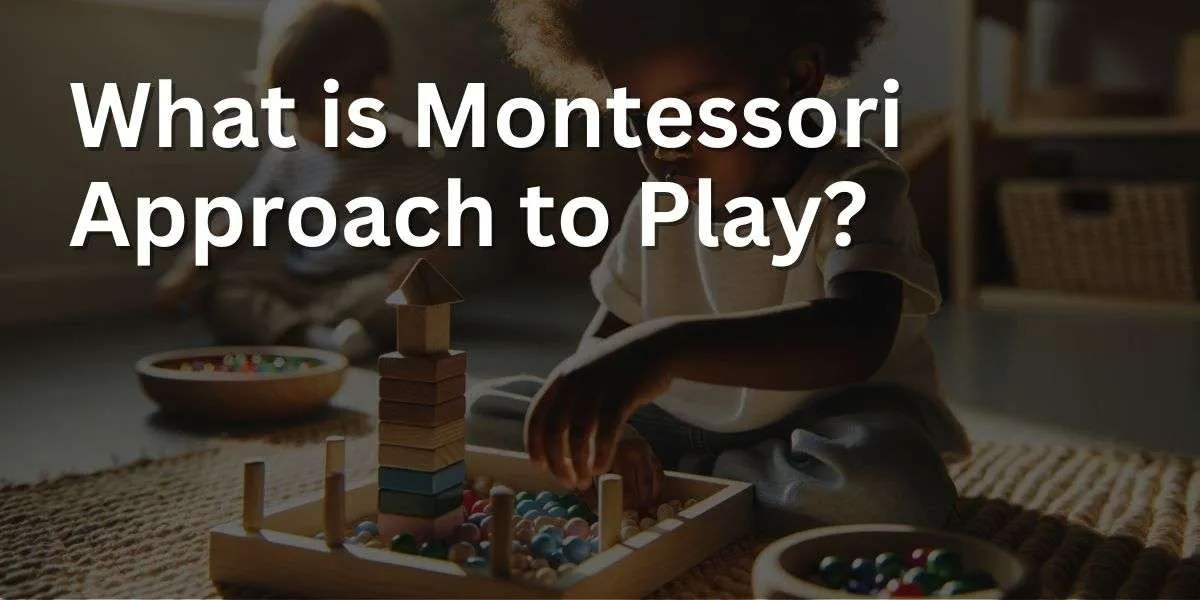Delving into what is Montessori approach to play reveals a distinct perspective that intertwines child-led exploration with purposeful learning. Instead of mere amusement, Montessori play acts as a bridge between a child’s curiosity and structured development.
The Montessori approach to play emphasizes the child’s autonomy in choosing activities that are intrinsically motivating. The environment is “prepared” – organized, simplified, and equipped with materials that stimulate learning at the child’s current developmental stage. Activities are tangible and reality-based, focusing on hands-on interactions with materials that refine sensory perceptions, cognitive abilities, and motor skills. The Montessori philosophy believes that children learn naturally through play when provided with the right tools and environment.
Intrigued by a play methodology that seamlessly blends independence with structured learning? Dive in with us as we unravel the core principles and subtleties of the Montessori approach to play.
Montessori play nurtures a child’s innate curiosity, fosters independence, and lays a robust foundation for lifelong learning. By creating an environment where children can explore, discover, and master skills at their own pace, Montessori play empowers them to become confident, self-motivated learners.
Key Takeaways: What is Montessori Play?
- Child-Centered Approach:
- Follow the Child: Montessori play is tailored to the individual interests and developmental stage of each child, allowing them to set the pace.
- Respect for the Child: Children are treated as capable and competent individuals, deserving of respect and autonomy in their play choices.
- Hands-On Learning:
- Concrete to Abstract: Children interact with tangible materials that offer sensory experiences, aiding in the internalization of abstract concepts.
- Manipulative Materials: Montessori toys and materials in a montessori school are designed for children to touch, feel, and manipulate, enhancing cognitive and motor development.
- Self-Directed Activities:
- Choice and Independence: Children choose their activities from a range of options, fostering decision-making and independence in Montessori play and Montessori education.
- Sustained Concentration: Without external interruptions, children can immerse themselves deeply in their chosen activity for extended periods.
- Prepared Environment:
- Order and Structure: The Montessori play space is carefully organized, with each item having a designated spot, promoting a sense of order and predictability.
- Safety and Accessibility: Everything is child-sized and within reach, allowing children to access and return materials independently.
- Purposeful Play:
- Practical Life Skills: Activities like pouring, sweeping, or buttoning cultivate real-world skills and foster independence.
- Skill Development: Each material has a specific purpose, be it refining motor skills, enhancing sensory perception, or understanding mathematical concepts.
- Mixed Age Groups:
- Peer Learning: Older children often guide and help younger ones, promoting leadership and cooperative learning.
- Holistic Growth: Being around different age groups allows children to learn various skills and social dynamics organically.
- Minimal Interruptions:
- Uninterrupted Play: Children are given uninterrupted time blocks to explore and engage with their chosen activities deeply.
- Natural Flow: This approach respects the child’s natural rhythms and concentration spans.
- Connection with Nature:
- Outdoor Play: Montessori emphasizes the importance of connecting with nature, be it through gardening, nature walks, or outdoor sensory play.
- Nature Materials: Natural materials like wood, cloth, and metal are preferred over plastic, offering rich sensory experiences.
- Teacher’s Role:
- Observer and Guide: Rather than directing play, the Montessori teacher observes and steps in only when necessary, guiding the child subtly.
- Responsive Assistance: The teacher provides support based on individual needs, ensuring challenges are appropriate to the child’s developmental stage.
Understanding Montessori Play
The Montessori approach to play prioritizes autonomy, exploration, and natural learning through child-led activities in a curated environment, with adults acting as guiding figures, leading to enhanced concentration and a genuine passion for learning.
The Montessori approach to play is deeply rooted in fostering autonomy, exploration, and natural learning. This method emphasizes child-led activities where children choose what they want to explore, allowing them to develop at their own pace.
The environment is carefully curated with purposeful montessori toys and materials that are designed to enhance specific developmental skills. Instead of providing overt instructions, educators and parents using the Montessori method act as guides, subtly directing children towards constructive play while respecting their individual choices.
This approach believes that when children are given the freedom to explore within a structured setting, they exhibit heightened concentration, creativity, and a genuine love for learning.
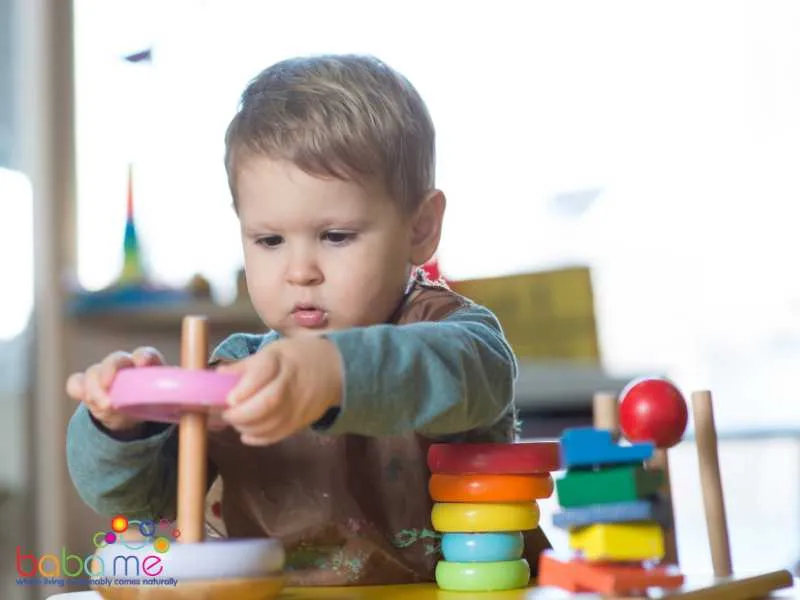
The Principles of Montessori Play
The principles of Montessori play emphasize a prepared environment, respect for the child’s innate learning capacity, hands-on experiences, and fostering independence, all within a setting that prioritizes self-directed and holistic growth.
The principles of Montessori play are anchored in creating an environment that promotes self-directed learning and holistic development. One of the foundational principles is the prepared environment, wherein the play space is meticulously arranged with purposeful materials that cater to a child’s natural curiosity.
Respect for the child is another core tenet, acknowledging their innate capacity for learning and allowing them the freedom to explore at their own pace. The role of the Montessori teacher or parent is not to instruct, but to observe and provide gentle guidance when needed. Hands-on learning is encouraged, emphasizing the importance of tangible experiences in cognitive development.
The principle of independence is fostered, empowering children to take charge of their learning journey and instilling a lifelong love for exploration.
Montessori Purposeful Play
Montessori purposeful play integrates play with intentional learning, focusing on activities that promote cognitive, emotional, and physical growth, using self-correcting materials that foster self-efficacy and confidence in children.
Montessori purposeful play is a distinctive approach that merges play with meaningful learning experiences. At the heart of this methodology is the belief that children are naturally inclined towards activities that contribute to their cognitive, emotional, and physical development.
Instead of mere entertainment, Montessori play is geared towards constructive outcomes, allowing children to engage with tasks that mirror real-life challenges and solutions. The materials used in this form of play are meticulously designed to be self-correcting, ensuring that kids receive immediate feedback and can adjust their actions accordingly.
Through this, they not only acquire new skills but also develop a sense of self-efficacy and confidence in their abilities to navigate challenges.
Montessori Uninterrupted Play
Montessori uninterrupted play offers children extended, undisturbed periods to deeply engage in activities, fostering their intrinsic motivation, promoting concentration, independence, and a profound love for learning.
Montessori uninterrupted play is a fundamental tenet of the Montessori philosophy that emphasizes the importance of providing children with extended periods of undisturbed time to engage deeply in their chosen activities. This approach recognizes the intrinsic motivation children have to explore, learn, and master their environment.
By allowing them to immerse themselves without external interruptions, they can follow their natural curiosity, delve deeper into tasks, and achieve a state of flow. This uninterrupted time, often referred to as work cycles, nurtures concentration, independence, and a genuine love for learning. It’s during these moments that children often make the most significant discoveries and connections about their world.
Montessori Outdoor Play
Montessori outdoor play emphasizes deep connections with the natural environment, allowing children to develop motor skills, scientific insights, and a genuine appreciation for nature through hands-on activities and exploration.
Montessori outdoor play centers around the concept of allowing children to connect deeply with the natural environment. This approach encourages kids to explore, observe, and interact with the world outside, fostering a sense of wonder and respect for nature.
Through activities such as gardening, nature walks, and sensory exploration, children develop essential motor skills, scientific understanding, and a profound appreciation for the ecosystem.
The outdoor environment in Montessori settings is often equipped with natural materials, promoting hands-on learning and encouraging children to manipulate, experiment, and discover. Such an environment cultivates not only physical growth but also emotional and intellectual development.
Examples of the Montessori Approach to Play
The Montessori approach to play offers examples like practical life exercises, sensorial materials, and cultural activities, all geared towards fostering self-directed learning, concentration, and a comprehensive understanding of the world around them.
Examples of the Montessori approach to play often manifest as activities designed to stimulate a child’s innate curiosity and drive for discovery. This approach emphasizes self-directed learning, where children choose the activities that interest them the most.
- Practical Life Exercises:
- Dressing Frames: Children practice buttoning, zipping, and tying using specially designed frames, fostering independence in self-care.
- Water Transfer: Using a sponge or a pipette, children transfer water between bowls, refining fine motor skills and concentration.
- Sensorial Materials:
- Pink Tower: A set of ten wooden blocks graded in size. Children stack them from largest to smallest, enhancing visual discrimination.
- Sound Cylinders: Sets of sealed wooden cylinders filled with different materials. Children match pairs by shaking and listening, honing auditory senses.
- Mathematical Materials:
- Spindle Box: A counting activity where children match numeral labels to corresponding quantities using spindles.
- Golden Bead Material: Children explore the decimal system, learning place values and basic arithmetic operations using tangible beads.
- Language Development:
- Sandpaper Letters: Tactile letters that children trace with their fingers, associating letter shapes with their phonetic sounds.
- Metal Insets: Geometric shapes that children trace and fill in, preparing their hands for writing.
- Cultural Studies:
- Puzzle Maps: Wooden maps with pieces shaped like countries or states. Children learn geography while refining motor skills.
- Botany Cabinet: A set of wooden leaf shapes, helping children classify and name different types of leaves.
- Art and Music:
- Color Mixing: Children mix primary colors to discover secondary colors, understanding the basics of color theory.
- Bells: A set of musical bells arranged in a chromatic scale. Children match and grade them by listening, fostering musical ear training.
- Nature and Science:
- Nature Trays: Collections of natural items like shells, rocks, or leaves for children to observe and classify.
- Magnetic vs. Non-Magnetic: Children use magnets to explore and categorize items based on their magnetic properties.
- Role Play and Dramatic Play:
- Montessori Play Kitchen: A realistic kitchen setup where children mimic cooking and cleaning, enhancing life skills and imaginative play.
- Community Role Play: Using realistic dolls and props, children act out different community roles, understanding societal functions.
- Physical and Outdoor Activities:
- Balancing Beam: Children walk on a low beam, improving balance and coordination.
- Gardening: In outdoor Montessori environments, children plant, water, and care for gardens, understanding plant life cycles and responsibility.
- Peace and Social Activities:
- Peace Table: A designated space where children can resolve conflicts, practice communication, and learn empathy.
- Group Activities: Collaborative tasks like group cleaning or group storytelling foster teamwork and social skills.
Dr. Maria Montessori’s method prioritizes the child’s innate desire to explore, learn, and grow independently. This philosophy’s emphasis on fostering independence, holistic development, and a love for lifelong learning. The materials and activities are meticulously designed to cater to children’s developmental stages, ensuring they gain skills and knowledge in a natural, enjoyable manner whether in a Montessori classroom or by Montessori style parenting with Montessori at home by creating a Montessori home playroom.
The Montessori approach to play is not just about playing but about learning through play, understanding the world, and developing as capable, confident individuals.
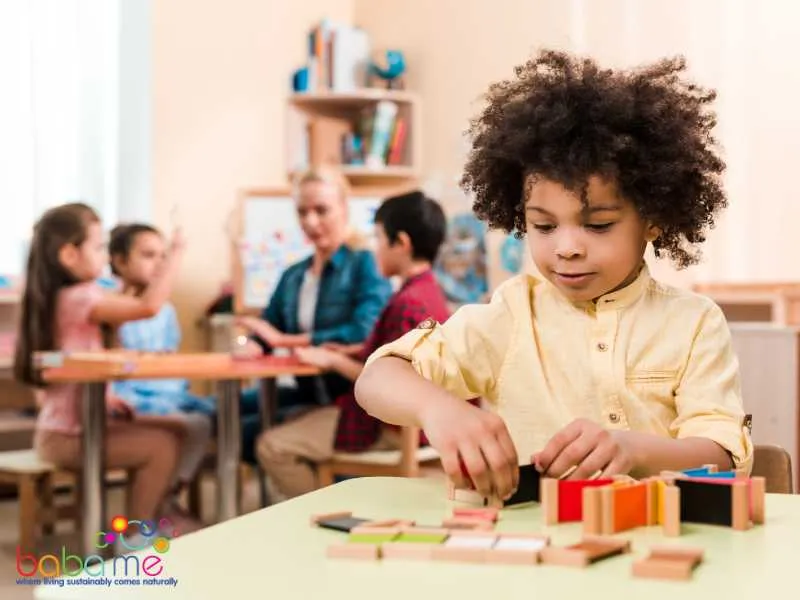
Montessori Play and Child Development
Montessori play significantly enhances child development by offering hands-on experiences that boost cognitive, physical, and emotional growth, while recognizing and catering to a child’s sensitive periods for optimal learning outcomes.
Montessori Play and Child Development are deeply interconnected, as the Montessori method prioritizes activities that cater to a child’s natural developmental stages. At the heart of this approach is the belief that children have an inherent desire to learn and explore.
Through hands-on experiences and self-directed activities, children strengthen their cognitive, physical, social, and emotional skills. The Montessori environment, with its specially designed learning materials and emphasis on independence, fosters a sense of responsibility, problem-solving capabilities, and a deep appreciation for learning.
The method also recognizes the significance of sensitive periods in a child’s life, where they are particularly receptive to acquiring specific skills or knowledge, ensuring timely and appropriate interventions.
The Benefits of Montessori Play
The benefits of Montessori play include fostering independent thinking, enhancing problem-solving skills, promoting social interactions, and offering hands-on experiences that boost sensory and cognitive development.
The benefits of Montessori play are numerous and profound. This distinctive approach to play emphasizes child-led activities that cater to a young learner’s intrinsic motivation and curiosity. One of the core advantages is the development of independent thinking and problem-solving skills. Children are encouraged to explore and learn at their own pace, fostering a love for learning that often lasts a lifetime.
The Montessori method promotes social skills as children often work together, learning cooperation, collaboration, and respect for others. The hands-on materials used in Montessori play are meticulously designed to aid in sensory and cognitive development, ensuring a holistic growth experience for every child.
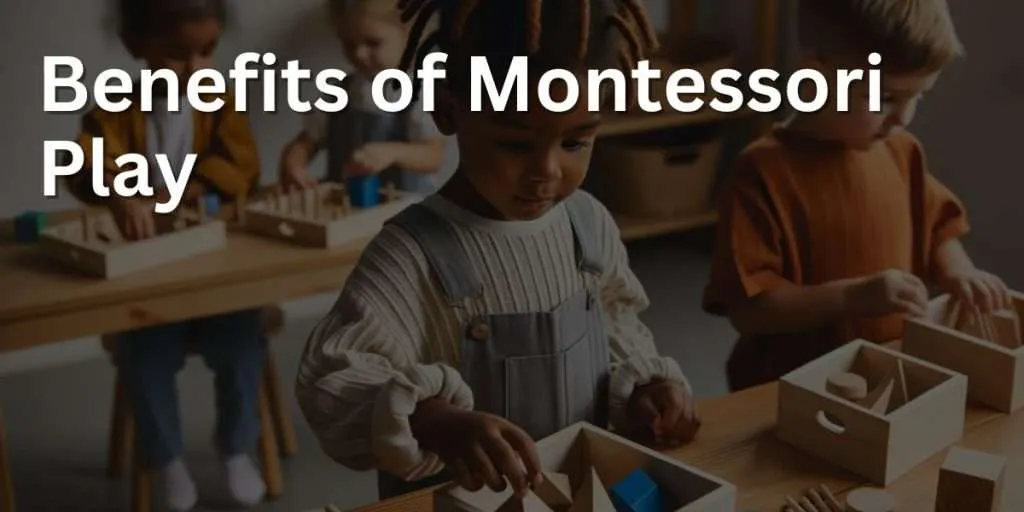
Montessori Play and the Sensitive Periods
Montessori play aligns with the sensitive periods identified by Dr. Maria Montessori, offering tailored activities and materials that cater to a child’s heightened receptivity to specific skills or knowledge, ensuring optimal developmental growth.
Montessori Play and the Sensitive Periods intertwine seamlessly, providing a holistic approach to early childhood education. Dr. Maria Montessori identified specific times in a child’s life, known as sensitive periods, when they are particularly receptive to acquiring certain skills or knowledge. These periods include the development of language, motor skills, order, and sensory refinement.
During these windows of heightened receptivity, children are naturally driven to engage in activities that cater to their developmental needs. Montessori play is meticulously crafted to align with these sensitive periods, offering tailored materials and activities that harness a child’s innate curiosity and eagerness to learn.
By recognizing and catering to these developmental windows, Montessori play ensures that children derive the maximum benefit from their learning experiences.
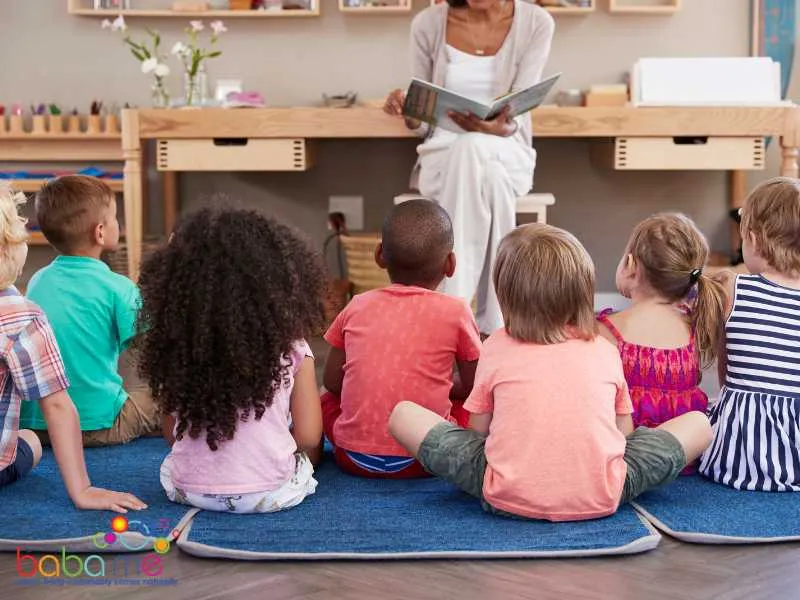
FAQs on Montessori Approach to Play
What is meant by the Montessori quote play is the work of the child?
In this famous quote, Maria Montessori emphasizes the importance of play in a child’s development. She believed that through play, children explore the world, learn social skills, and understand their environment. In Montessori’s view, play isn’t just leisure – it’s a crucial part of a child’s growth and a self-guided exploration that lays the foundation for future learning.
What is Piaget’s theory on play?
Jean Piaget, a renowned psychologist, believed that play is a vital part of a child’s cognitive development. Like Montessori, Piaget recognized that through play, children learn about the world and their role within it. Interactive play helps children grasp the concept of cause and effect, encouraging creativity, and developing problem-solving skills. This learning is critical for every age group.
Is the Montessori play based?
Yes, the Montessori approach is play-based, but it’s more accurately described as child-led or self-guided play. This means children have the freedom to choose the activities they engage in during their school day, moving at their own pace. The activities or “work” in Montessori classrooms often look like play at first glance, but they’re carefully designed to encourage learning and skill development.
Why is Montessori against pretend play?
The Montessori approach isn’t against pretend play; instead, it emphasizes real-life experiences and hands-on activities. Maria Montessori believed that many children love to learn about the world around them through practical, real-life activities. While make-believe games and other toys aren’t excluded, the focus is on activities that develop life skills and promote independence. Montessori activities are more about closed play activities rather than unstructured play.
What is the role of play in the Montessori classroom?
Play is a fundamental part of the Montessori classroom. It’s seen as a child’s work, providing them with opportunities to explore, discover, and learn. Whether it’s solitary play or interactive play with peers, it contributes to their cognitive, physical, and emotional well-being. Montessori teachers reduce screen time and encouraging active, engaged playtime can be a great resource for supporting a child’s healthy development.
Is open ended play Montessori Play
Yes, open-ended play aligns with the Montessori philosophy, emphasizing child-led learning, creativity, and independent decision-making. The Montessori philosophy embraces the principles of child-led learning, where children are encouraged to explore and discover at their own pace. Open-ended play aligns with this philosophy, as it provides children with opportunities to use their imagination, creativity, and problem-solving skills without predefined outcomes or rigid instructions.
In Montessori settings, open-ended montessori materials like wooden blocks, loose parts, and natural objects are often incorporated, allowing children to interpret and use them in a multitude of ways. This form of play not only nurtures cognitive and social development but also empowers children to be independent thinkers and decision-makers.

